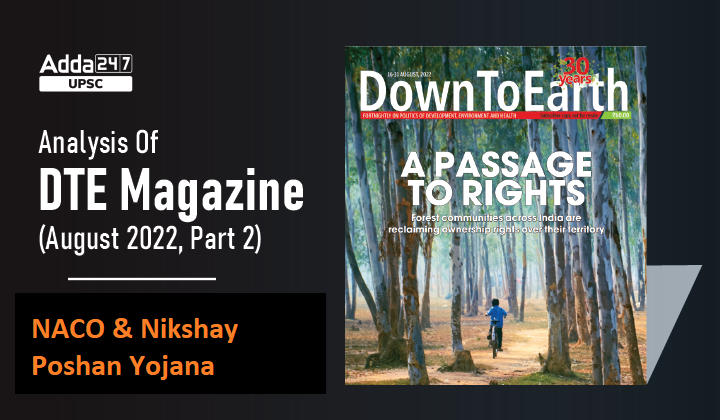Table of Contents
Down To Earth Magazine is a fortnightly magazine focusing on politics of environment and development, published in New Delhi, India.
UPSC Previous years’ questions on Development, Environment, Health and Disaster Management give us a clear idea about the increased importance of Down To Earth Magazine.
Down To Earth Magazine is one of the most important and indispensable source for UPSC Civil Services Exam Preparation. Keeping this in mind, here, we come with ”Gist Of Down To Earth Magazine” which covers important environmental current affairs articles in smooth pointed form, keeping in mind the demand of UPSC aspirants.
National AIDS Control Office (NACO)
Why in news?
- An estimated 40 million people are living with HIV globally, as per the World Health Organization (who)—depends on a cocktail of drugs to supress the viral load in his blood.
- The drugs, known as antiretroviral therapy (ART), delay the progression of the infection into acquired immunodeficiency syndrome (AIDS) and result in fatal consequences.
About National AIDS Control Office (NACO)
- National AIDS Control Organization is a division of the Ministry of Health and Family Welfare that provides leadership to HIV/AIDS control programme in India through 35 HIV/AIDS Prevention and Control Societies.
- In 1986, following the detection of the first AIDS case in the country, the National AIDS Committee was constituted in the Ministry of Health and Family Welfare.
- As the epidemic spread, need was felt for a nationwide programme and an organization to steer the programme. In 1992 India’s first National AIDS Control Programme (1992-1999) was launched, and National AIDS Control Organization (NACO) was constituted to implement the programme.
- Latest data with NACO, which works under the Union Ministry of Health and Family Welfare, shows that of the 2.31 million people living with hiv in India, 1.4 million receive free treatment from its 680 art centres located across the country.
Nikshay Poshan Yojana
Why in news?
Only two-thirds of people living with tuberculosis benefitted from the Union government’s sole nutrition support scheme last year, highlighting bottlenecks in the fight against a major public health concern.
About Nikshay Poshan Yojana
- The Nikshay Poshan Yojana entitles every tuberculosis (TB) patient, seeking treatment in either the public or private sector, to a direct benefit transfer (DBT) of R500 per month for nutritional needs.
- It was launched in April 2018, and until February 2022, around R1,488 crore has been paid to 5.73 million notified beneficiaries.
What data say?
- Data from the latest “India TB Report 2022”, released by the Union Ministry of Health and Family Welfare in March, shows that only 62.1 per cent of 2.1 million notified cases across the country received at least one payment in 2021.
- India has set a target to eliminate TB by 2025. Experts believe that to reach this goal, the country must go beyond the medical aspects.
- Undernutrition is a major risk factor that drives TB, acknowledges the World Health Organization.
- Studies on the scheme since its inception highlight several hurdles in the DBT process.
- One 2018 paper in the Indian Journal of Tuberculosis, which surveyed 119 registered patients in Delhi between July-September that year, finds that “non-availability of bank accounts and unlinked bank accounts were some challenges faced by both health providers and patients.”
- Another 2020 study published in the Journal of Family Medicine and Primary Care underlines lack of communication, stigma, illiteracy and the multi-step approval process as key hurdles.
- States have their own nutritional support schemes, but caveats remain here too; for instance, some schemes are only for patients showing resistance to TB drugs.
- Any investment in diagnostic treatments is irrelevant if people fighting TB are living on an empty stomach.
- It affects the poorest populations and almost every family is in financial distress due to medical costs and lost wages.
- So, a broader approach is needed to prevent TB, that should include food support for those in close contact with the patient as they are also at high risk of contracting the disease.



 TSPSC Group 1 Question Paper 2024, Downl...
TSPSC Group 1 Question Paper 2024, Downl...
 TSPSC Group 1 Answer key 2024 Out, Downl...
TSPSC Group 1 Answer key 2024 Out, Downl...
 UPSC Prelims 2024 Question Paper, Downlo...
UPSC Prelims 2024 Question Paper, Downlo...
